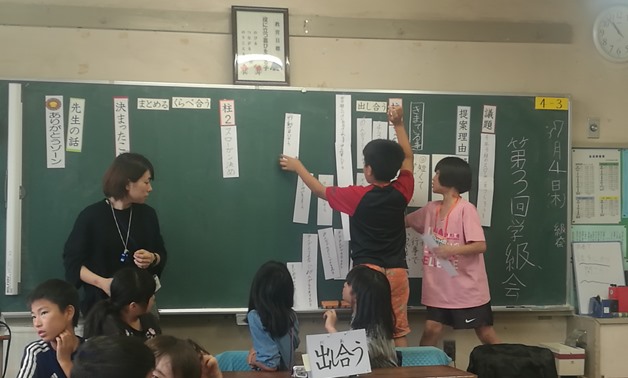
A Tokkatsu class at Asakawa Elementary school in Japan, July 2019- Egypt Today/Aya Samir
TOKYO– 15 July 2019: I got the chance to spend a day with Yuto, Jury, Mio,Aoei and Taktoin their fifth grade class in Asakawa Elementary school in Japan,and chat about their regular school day and how they spend their time.
Moreover, we talked about the Tokkatsu activity which has been recently applied by Egypt in the Japanese schools.
“Normally we have five to six classes per day; each class lasts for 20minutes followed by a short period of rest. Our classes include math, art, music, social studies and history. We only take one English class per week starting from the fourth grade,” the students said.
Enjoying their lunch which was previously prepared by the school chefs, they added that they normally take one to two Tokkatsu activity classes during the week. In case one of them forgot to do the homework or showed any kind of aggressive behavior, teachers normally direct the students to apologize.
 Asakawa elementary school, July 2019- Egypt Today Aya Samir
Asakawa elementary school, July 2019- Egypt Today Aya Samir
The grades system in the Japanese schools usually depends on regular tests, and music and arts are taken seriously.
What is Tokkatsu?
As identified byAsakawa elementary school Principal, Ms. Hiromi Shimizu, Tokkatsu is a kind of student activity which builds the students’ characters to make them more independent and positive.She said that studies have been conducted on students’ behavior before and after applying the Tokkatsu activities, and showed significant transformation in students’ behaviors. Students turn into more engaging and open individuals who are willing to participate in discussions without fear.
 Asakawa elementary school Principal, Ms. Hiromi Shimizu during a presentation about Tokkatsu activity, July 2019- Egypt Today Aya Samir
Asakawa elementary school Principal, Ms. Hiromi Shimizu during a presentation about Tokkatsu activity, July 2019- Egypt Today Aya Samir
The Japanese schools have strict rules regarding the students'looks and attitude. For example,female students are not allowed to wear artificial nails or hair. They are also highly selective about the food cooked in schools as they attach great importance tostudents’ nutrition and health.
Ms. Shimizu said that her experience at this school which started nearly a year ago was not her first. Basically, she participated in applying Tokkatsuin other Japanese schools, along with other Asian schools and recently the Egyptian schools.
Tokkatsu has no specialized books that can be taught to teachers or students, it is more like an inherited legacy and culture that senior teachers pass to new ones to apply on students. “Tokkatsu is a spoken science,”according to Shimizu.
 Asakawa elementary school, July 2019- Egypt Today Aya Samir
Asakawa elementary school, July 2019- Egypt Today Aya Samir
She believes that Tokkatsu,which was discovered and applied more than 60 years ago, can be applied in any country and with any culture.It is a heritage of no boundaries.
However, Tokkatsu can be given the right way or the wrong way, as there is no text book tobe used as a reference. We have to make sure that teachers understand Tokkatsu. By implementing Tokkatsu and enhancing the students’ personality, they become effective members of the society, and feel the value they can add to it.
 Asakawa elementary school, July 2019- Egypt Today Aya Samir
Asakawa elementary school, July 2019- Egypt Today Aya Samir
Replying to Egypt Today's question about training the Egyptian teachers in the current version of the Japanese schools in Egypt, Shimizu said that many Egyptian teachers came to Japan to take the Tokkatsu training, and that she met and trained some of them, and that some of them became her friends.
“We understand that we have an education system different from the on
e in Egypt, or any other country; however, Tokkatsu is not just about learning, it is also about building personalities,”Shimizu said.
By the end of the academicyear, teachers will have to fill a form to check if all of the Tokkatsu goals have been achieved during the year. This is the only aspect throughwhich they can check if Tokkatsu was successful or not.
“Tokkatsu can be applied anywhere around the world. Eventually,Tokkatsu is about changing people’s mind sets to be more motivated to participate in the society even more,” Shimizu said.
Nearly 35 schools have opened their doors and received Egyptian students for the academic year 2018/2019. Five more schools are expected to open during the next year, according to JICA's Egypt Office Chief Representative, Yoshifumi Omura, during an interview with Egypt Today inJune 2019.
“In 2018, we opened 35 and next year we are planning to open five more, which means that the total number will reach 40 schools,” Omura said.
“And of course we expected to face some difficulties and problems in the beginning because the whole idea is new. But so far, I can say that the experience is pretty much successful, despite everything that happened during setting up the process last year,” Omura added during his statements.
He pointed out that the Japanese schools in Egypt will be just about changing the educational system not the materials, because materials “are based on the country itself”.
“For example, what president Sisi admired when he visited the elementary schools in Tokyo was how the students were very clean and organized, and so he said, 'this is a walking Quran'.. Which means this is exactly what the Quran told us to do. Then he asked us to coordinate with the Egyptian government on this regard,” Omurarecounted.
 Egypt Today reporter with Asakawa Elementary school students at their fifth grade class, July 2019/Egypt Today
Egypt Today reporter with Asakawa Elementary school students at their fifth grade class, July 2019/Egypt Today





Comments
Leave a Comment